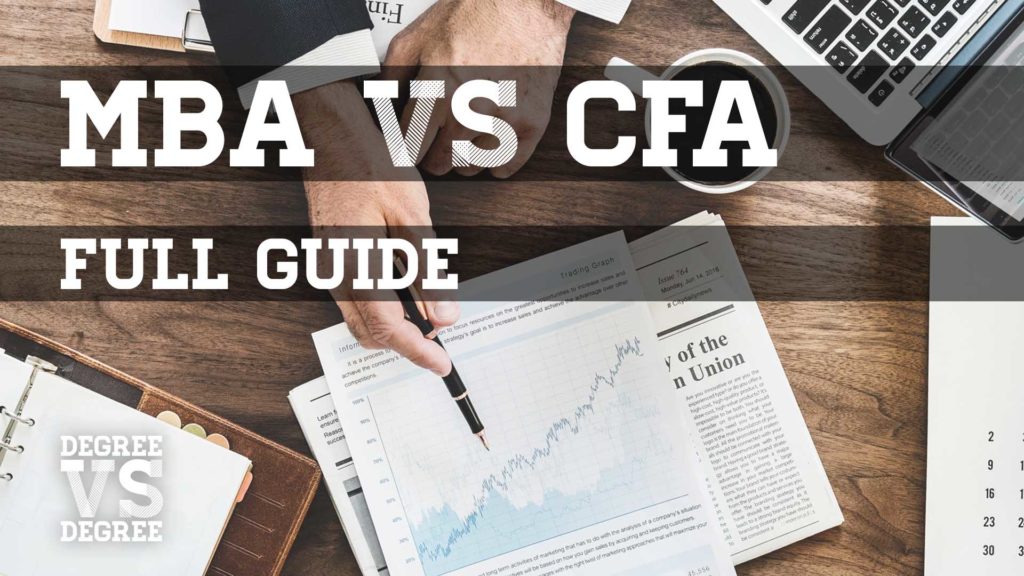Let us start at the basics. What is the difference between an MBA and CFA? This is a question you may have asked. Don’t worry, you are not alone in wondering this – let’s take an in-depth look at both below.
MBA
An MBA stands for Master of Business Administration. It is a two-year course that goes over the essentials of business management and administration. An MBA is sought after because of the kind of opportunities it opens you up to. Apart from the skills you learn through the degree, you will also be exposed to a network of important people in the business world, by way of alumni of your college, your faculty and visiting professors. The ranking of MBA schools, therefore, is based on the program’s ability to put you in touch with the right people.
CFA
 A CFA stands for Chartered Financial Analyst and is a title granted by the CFI Institute. It is a globally recognized certification program that equips you to specialize in financial fields and important subjects that can be relevant to your employment prospects. These include fixed income, private equity, derivatives, real estate, etc. The certificate program is divided into three levels of examinations which you are required to clear in a serial order.
A CFA stands for Chartered Financial Analyst and is a title granted by the CFI Institute. It is a globally recognized certification program that equips you to specialize in financial fields and important subjects that can be relevant to your employment prospects. These include fixed income, private equity, derivatives, real estate, etc. The certificate program is divided into three levels of examinations which you are required to clear in a serial order.
While for an MBA, you would be enrolling yourself in a school and taking classes and giving exams in a span of two years, CFA is a self-study program and the rigorous curriculum is then tested after you have taken out enough time to study and appear for the exam.
You can clear the exams at a stretch or you can give them over the years, whereas in the case of an MBA you would be graduating and two years and can call yourself an MBA. CFA and MBA also prepare you for different but interlinked subjects. While an MBA is for business and management skills and has a wide focus, a CFA® certification program is focused on finance.
What Are the Kind of Jobs You Can Get after Each?
With an MBA, you have a wide array of options when it comes to a job but no specialization. The following are the industries you can hope to find employment in after an MBA:
- Consulting
- Technology
- Media and Entertainment
- Financial Services
- Consulting
- Education
- Government
These were just some of the areas of employment you can explore. The idea of the degree is to equip you to manage an administration and business. That applies to any kind of business so an MBA does give you some flexibility to carve a career path afterward.
In the case of a CFA® certificate, you have a deeper focus on finance and can choose a specialization accordingly. The following are some of the jobs those who could acquire a CFA title are able to explore:
- Financial Research Analyst
- Financial Consultant
- Risk Management
- Financial Advisor
- Portfolio Manager
- Relationship Manager
These are all very specific career routes you can take after being certified as a CFA.
Which One Should You Choose?
While both are respectable and credible titles, you may want to pick one over the other depending on factors that are unique to each individual. For example, what is your budget? And, what specific career plans did you have in mind? These are all important questions that will help you decide which program you should choose:
Tuition Fee
The tuition fee is important to consider as it raises the question of your budget. An MBA typically costs between $65,000 and $100,000. You can either apply for financial aid and scholarships or you finance your own admission. In most cases, students end up taking out student loans.
In the case of a CFA® certification, you will go through the CFI Institute. It costs approximately $1,000-$1,700 to take each of the exams. Apart from that, you may have some expenses when it comes to the study material and textbooks. Since this is a self-study program, there is no “tuition” fee as such. If you have a constrained budget and taking a student loan is not something you have enough credit scores for, a CFA would be a good program to consider over an MBA.
Return on Investment
The return on investment is decided by the type of jobs you acquire after completing the course. For example, if you take a loan out for an MBA, you should be able to pay the loan back within the first few years of your employment. Often, this is possible though the pressure to get a high-paying job immediately after completing your MBA is quite high. It makes the most sense to pursue an MBA only if you get into one of the top schools. If it is not a school that can put your foot through the right doors, the money is not well spent.
Since acquiring a CFA certificate is a lot less expensive than an MBA, it would be unfair to say it has a better return on investment. Chances are you will get similarly paying jobs after doing either. If you do both, however, that increases the chances of better employment two-fold.
Career Plans
Finally, a CFA is better suited for somebody who has a very specific finance-related career goal. You would be dedicating at least five years of your life to clear all three exams as the tests are fairly hard to crack and you may require more than one attempt. An MBA takes only two years and opens you up to a variety of different employment options, including the job prospects a CFA would open you up to. The difference is that since you do not have a specialization, you may have to rise through ranks more.
Final Thoughts
Finally, picking one over the is based on how different factors line up for you. These are both reliable, respected and trusted programs and either of the two on your resume gives you a glowing recommendation. So pick one based on your budget and career goals or pick both if you can afford to!
You can only benefit from these programs if you choose to go for them at the right time in your life and are strategic about using the network it opens you up to.

